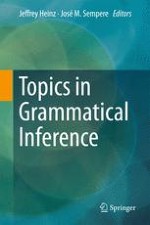2016 | OriginalPaper | Chapter
4. On the Inference of Finite State Automata from Positive and Negative Data
Authors : Damián López, Pedro García
Published in: Topics in Grammatical Inference
Publisher: Springer Berlin Heidelberg
Activate our intelligent search to find suitable subject content or patents.
Select sections of text to find matching patents with Artificial Intelligence. powered by
Select sections of text to find additional relevant content using AI-assisted search. powered by
